Why Does a Dog Snore?

Hearing a dog snoring while asleep is not uncommon. Though generally viewed as cute, this habit can indicate an underlying medical condition.
How do you tell a harmless snore from one caused by health issues? Do some breeds snore more often than others? Can you stop your pup from snoring?
Keep reading to find the answers to why snoring occurs, as well as many other questions below.
Why Does a Dog Snore?
Snoring is a normal part of canine breathing patterns while asleep. When a dog dozes off, the air passes through the mouth, and the dog's nose gets partially blocked. This causes the vibration of respiratory structures, resulting in a peculiar rattling or whistling sound.
If your pooch is otherwise happy, healthy, and active, loud breathing in their sleep now and then shouldn’t be a cause for concern.
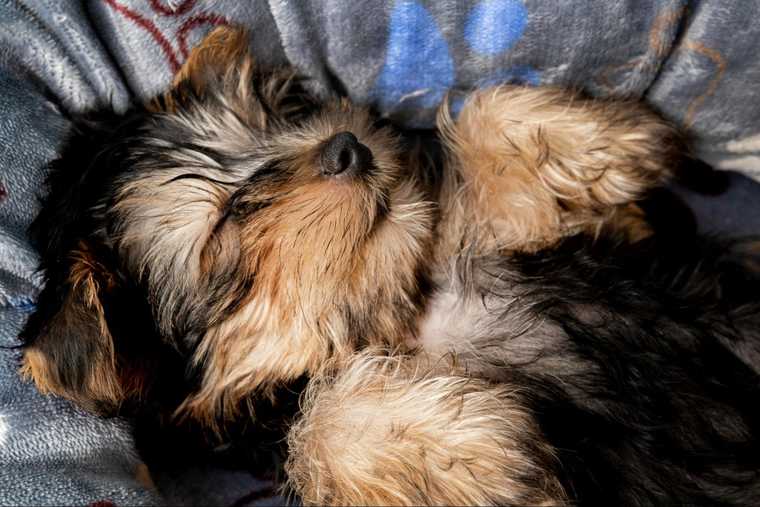
Note: It’s also common for canines to bark in their sleep. You can read more on barking while sleeping.
Is It Normal for Dogs to Snore?
Occasional snoring is perfectly fine, and most canines do it at some point. However, sometimes, owners should bring the problem to a vet’s attention, as underlying illnesses or allergies can cause it. Consulting a vet helps determine the exact reason for changes in a dog's breathing patterns and how to treat it effectively.
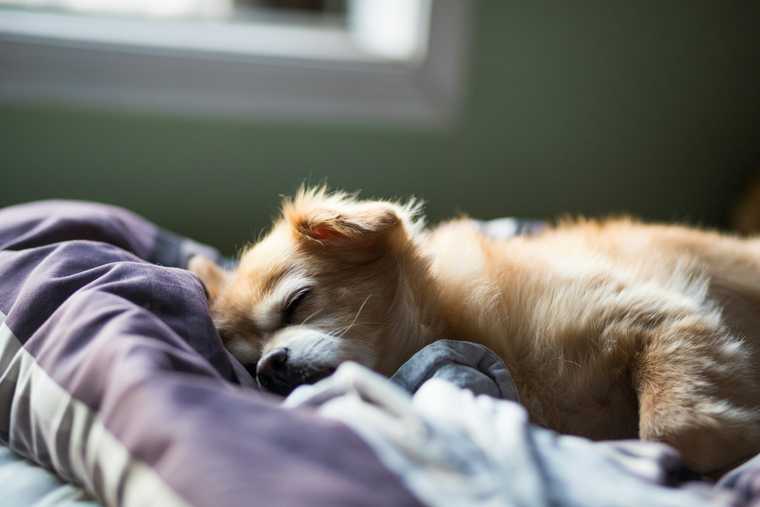
Some signs of abnormal snoring in canines:
-
Rapid start with no previous history: Something likely caused the condition, such as a foreign body in the airways or a newly developed allergic reaction/infection.
-
The dog snores while awake: Some breeds are prone to breathing problems even when not sleeping. However, it can significantly reduce their quality of life and put them at risk of respiratory crises. Considering your pup's medical history, a qualified vet can help choose the optimal way to address breathing difficulty.
-
Other symptoms are present: If snoring isn’t typical for your furry companion and you observe nasal discharge, sneezing, or lethargy, seek medical intervention as soon as possible.
What Causes a Dog to Snore?
Canines snore for different reasons. Identifying the reason for disrupted breathing is vital for addressing the issue correctly. Let’s review the most common reasons why dogs snore.
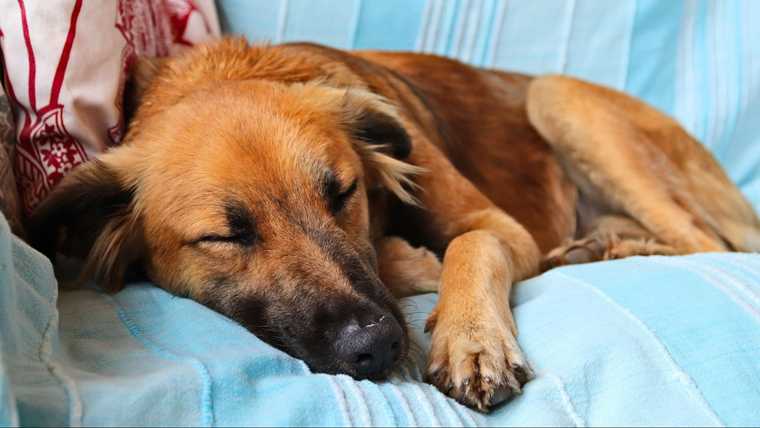
Structural changes in airways
Due to their specific anatomy, some canine breeds are predisposed to obstructed breathing, even when awake. Brachycephalic breeds have shortened, flat faces paired with other structural deformities (narrow nostrils and trachea, long soft palate, and atypical tissue formation in the throat) that often lead to peculiar breathing patterns.
Some of the breeds with natural tendencies to snore include:

- Affenpinscher
- Boxer
- Chow Chow
- English Bulldog
- English Toy Spaniel
- French Bulldog
- Pekingese
- Pug
Allergic reaction
If your dog snores a lot, you may suspect they’re suffering from an allergy. Allergic reactions often cause airway tissue to swell, which may cause an obstruction preventing the air from passing freely through the nostrils and throat. Because of inflammation, the airways get tighter; air can hardly go through the airways, producing a familiar rattling sound.
Dog's sleeping position
Many owners notice that their dogs snore while sleeping on their backs.
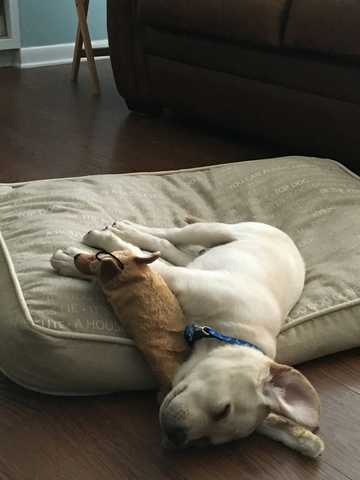
This phenomenon occurs when your pooch relaxes on their back, allowing the tongue to move against the back of the throat. This temporarily partially blocks the airways. Such a problem often resolves itself when the pet changes their body position.
Excess body weight
An overweight dog snores much more often than one with a healthy body weight. Obesity causes extra pressure on the airways since fat deposits can be located around the neck. In such cases, weight loss is effective in tackling the issue.
Foreign objects
Dogs are notorious for their curiosity (and it’s not because they're curious— they’re foragers and have a natural tendency to search for food, which leads to active sniffing and discovering the objects surrounding them).
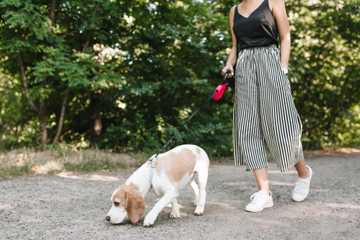
Sometimes, such eager exploration leads to snorting small objects in the airways. Such cases are often accompanied by nasal discharge and sneezing, as an attempt to remove the object.
Growth inside the airways
Proper airflow can be impossible due to tumors, nasal polyps, or other growth inside a the airways. Whether the masses are benign or malignant, they can cause difficulty breathing and significantly impact life quality. If you suspect growths to be the cause of the problem, consider removing them surgically.
Respiratory illnesses
Snoring in dogs can result from infection (bacterial or fungus), asthma, nasal dermatoses or fluid accumulation. Like allergies, these illnesses also cause the swelling of the airway tissue. You may also notice a decrease in your dog’s appetite, energy level, and nasal discharge.
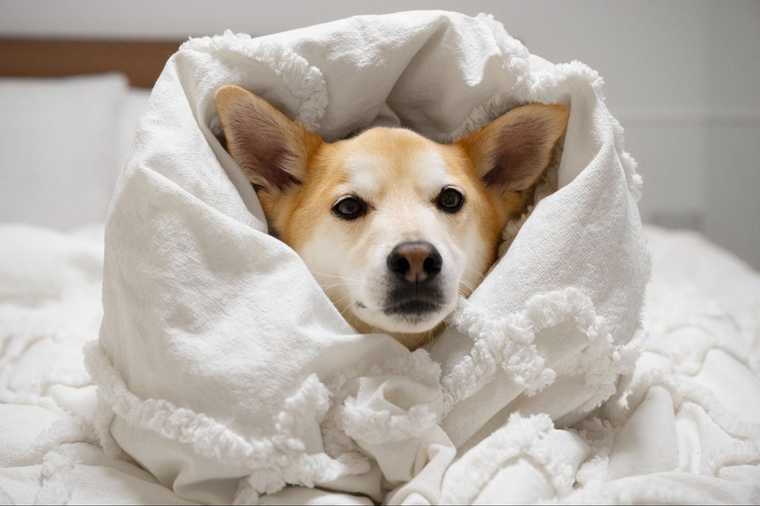
What Should I Do About My Dog’s Snoring?
Not all snoring requires intervention. Occasional loud noises while your furry friend sleeps are normal. However, pathological snoring is a cause for concern.
To restore normal airflow:
- Identify if their breathing patterns are normal.
- Consult a vet to determine the reason for abnormal snoring.
- Treat underlying medical issues or modify the dog’s environment.
Note: If your pooch has difficulty breathing because of their anatomy or growths in the airways, you may consider surgical help to clear out the structures.
How to Get a Dog to Stop Snoring
There’s no one-fix-all solution to breathing issues in canines. How you should address the problem depends on why the condition occurs. We’ve picked some of the most effective approaches to stop snoring in dogs.
Experiment with body position
If a dog snores only when sleeping on their back, try adjusting the position of their head. Start gently nudging a pup into lying on their belly with their head on their paws. Alternatively, roll them on their side and put a small pillow or a stuffed toy under their neck to reduce the pressure on the airways and ensure better airflow.
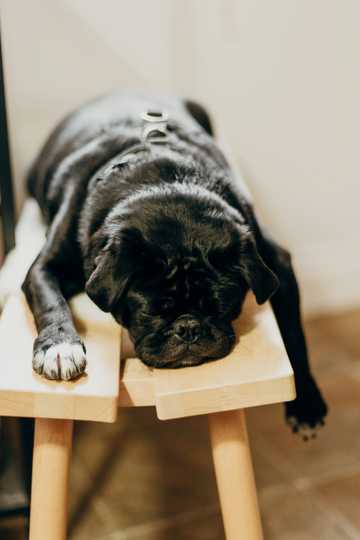
Make sure to be cautious and predictable for the dog! If they wake up scared with your touch, they might behave aggressively, so warn your pooch before manipulating their body.
Remove allergens
One of the most common allergens for canines is dust. If your dog has this allergy, pay extra attention to keeping their bed clean. Use a humidifier to increase the air humidity, and vacuum your place regularly.
Promote weight loss
Lack of physical activity and poorly balanced nutrition often cause a pooch to become chubbier. This can lead to many health issues, including intensive snoring. Adjust your dog’s diet and exercise plan to encourage weight loss. Losing extra pounds works magic to improve a pet’s quality of life in different areas. Breathing difficulties are no expectation.
Arrange regular vet checkups
Visiting a vet is essential to prevent and treat medical conditions that cause snoring. A qualified professional can help determine why your dog snores (infection, tumor, genetic makeup, and more) and choose the optimal treatment.
A vet consultation is also necessary if snoring accompanies other symptoms, like loss of appetite or nasal discharge. In that case, seeking medical assistance is urgent.
Wrap Up
Dog snoring is normal if it happens rarely and isn’t intense. Certain dog breeds are prone to disrupted breathing because of their anatomical peculiarities. However, if the condition starts suddenly and goes hand-in-hand with other symptoms, you should consult a vet to determine the cause. Proper medical assistance and lifestyle modifications are often enough to treat the problem.
Frequently Asked Questions
- Why is my dog snoring so loud all of a sudden?
Sudden loud snoring in a dog is most likely related to a health issue and requires a vet’s consultation. Common causes of dog snoring include infections, foreign objects or growths in the airways, allergies, and dental problems.
- Why does my dog snore while awake?
Snoring during awake periods is frequent and requires medical attention. Due to their specific skull structure, brachycephalic dogs are sometimes prone to this condition.
- Do dogs snore as they get older?
Many dogs start to snore as they age. This is likely related to changes in their sleep patterns, weight gain, or the development of age-related medical conditions.
- Is it bad if my dog snores?
Snoring is usually normal and harmless, so you shouldn’t worry about it. However, a dog with sudden and intensive snoring and other symptoms should be examined by a vet.
- Do dogs snore when they’re tired?
Yes, dogs often snore when tired and relaxed after a stressful day. This is due to heavier breathing, which is associated with relaxation in sleep.

Passionate team dedicated to help pet owners raise safe and obedient dogs, fostering meaningful connections with their furry companions.

Certified dog trainer, exclusive positive reinforcement methods & tackling aggression problems.